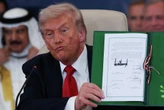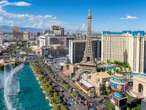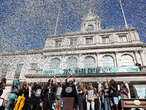Speaking to his biographer Walter Isaacson, Elon Musk said of his approach to authority: “I guess I’ve always wanted to push my chips back on the table or play the next level of the game.” Isaacson later quotes Musk as saying, “I’ve got a bad habit of biting off more than I can chew.”
At present, both those quotes seem to be the case for Musk, who has reportedly received a letter from the Department of Justice (DOJ) this week warning him that his lottery to give registered voters in swing states $1 million for signing a petition in favor of the First and Second Amendments could well be illegal.
Musk had launched the lottery earlier this month, targeting voters in key swing states including Arizona, Pennsylvania, North Carolina, Georgia, Michigan, Nevada, and Wisconsin to sign a petition his America PAC organized in support of free speech and the right to bear arms. So far, three registered Republican voters in Pennsylvania each received a $1 million check from the PAC, which had planned to disburse further payouts right through election day. As those checks were being handed out, a number of organizations pointed out that Musk’s offer may well be illegal. Public Citizen, a public advocacy group, filed a complaint with the Federal Election Commission (FEC) about the prizes, saying it “appears to constitute payment to encourage voter registration and to influence votes.”
A fourth winner also received their check, but what should have been the fifth payout on Wednesday did not occur.
That was the same day CNN first reported that the DOJ had sent Musk a letter warning him about the potential illegality of what he’s doing. “Perhaps Musk has got the message this time and decided it wasn’t worth taking the risk,” says Rick Hasen, a political science professor and chair in law at UCLA. Hasen was among the first to allege that Musk was veering into “clearly illegal vote buying” in a blog post last week. (Musk did not respond to Fast Company’s request for comment.)
Hasen believes Musk may well have received legal advice that the way his giveaway was structured would avoid legal liability under vote-buying rules. But to Hasen’s mind, it’s an obvious infringement. “Federal law is clear that you cannot pay people to register to vote, and payment can include offering someone a lottery,” he says. Those who have defended the lottery, however, claim it’s for those who sign the petition, rather than for registered voters. “I don’t find that convincing because you still have to show that you’ve registered to vote, and therefore that’s a condition that should be enough to make it illegal under federal law,” says Hasen.
But the way Musk has chosen to walk the line of electoral law at best—and breached it as worst—is part and parcel of his broader attitude. He is already required to have a lawyer vet any of his posts on X about Tesla, as part of a settlement with the Securities and Exchange Commission (SEC) over alleged market manipulation using the platform then known as Twitter. Musk’s latest attempt to get that oversight overturned was rejected back in April.
“Musk has had a complicated relationship with the U.S. government,” says Steven Buckley, a lecturer in digital media sociology at City, University of London, who specializes in social media and American politics. “His somewhat arbitrary crusade for free speech and pushback against government regulation often seems to contradict his eagerness to accept large contracts from the government that help fund his various companies.” And Musk’s general approach to authority seems to ask for forgiveness for breaching rules, not for permission.
Buckley believes that Musk wouldn’t necessarily care if he was breaking the law, based on the mentality he has as a result of his entrepreneurial spirit and the general “move fast and break things” approach the tech sector has, in contrast to politicians. “For Musk, laws, legislation, and regulation are all barriers to him achieving his goals, which he views as imperative to the survival of the human race,” Buckley says. “If he truly feels that humanity is on the line, then it is of no surprise that he’d be willing to bend or break these things.” After all, Musk did buy Twitter for $44 billion as part of what he saw was a crusade to retain and regain the right to free speech against what Musk terms the “woke mind virus.”
In light of that, UCLA’s Hasen believes Musk may have previously “just decided to plow ahead,” he says. “But since he did provoke a reaction from law enforcement, it may just not be worth it.” There is one silver lining for Musk, however, that both Hasen and Buckley highlighted. “Given his clear desire for attention, I would not be surprised that he sees an upside around all these potential lawsuits against him as it would help him further paint the picture that he is a victim of political persecution,” says Buckley.
Or, as Hasen puts it: “He’s already gotten a tremendous amount of free publicity for his PAC and his efforts through what he’s done already.”








No comments